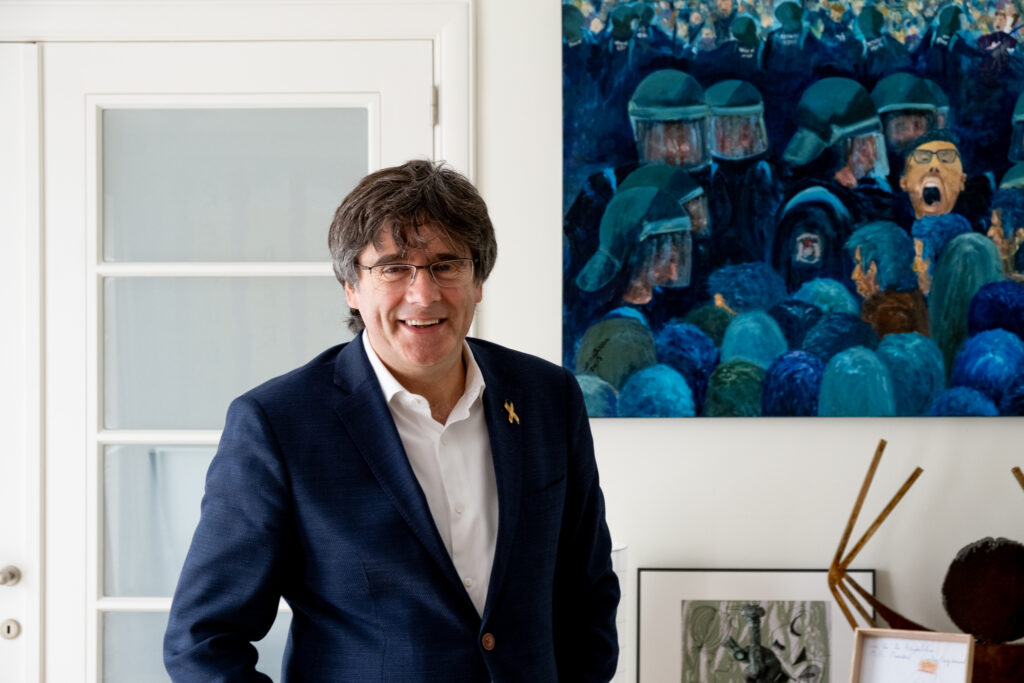23.05.2019 - 08:22
|
Actualització: 23.05.2019 - 10:22
President Puigdemont has been exiled for a year and a half and now he is standing in next Sunday’s European elections. He explains that this is part of the Catalan strategy for an independent republic. In our interview at the House of the Republic, in Waterloo, he discusses Europe, Catalan independence, and his opponents on the unionist and pro-independence camps. The first thing he does when he meets us is to brew some coffee in the house kitchen. The last thing, once the interview is over, is to show us a collection of original issues of Ariel [a literary journal published in Barcelona in the late 1940s]. “You enjoy culture, don’t you?”, he asks, as his fingers linger gently and admiringly on the magazine. Between one thing and the other, Puigdemont takes some time to answer our questions.
—Why do you wish to be an MEP? What is the point?
—Becoming an MEP must be understood as another move in the Catalan strategy for an independent republic where two circumstances stand out: in July last year I was stripped of all my political rights. Politically speaking, I’m crippled. I was not allowed to be voted president in parliament and I am not allowed to pursue my reinstatement as president of Catalonia. Secondly, these European elections come at a time when our foreign efforts have matured. This allows us to take a big leap forward. It’s for the sake of our foreign action and the exiles.
– What would you say to a European citizen, why are you running for the European parliament?
—What are your views on Juncker?
—The Brexit president. He is a disappointment. If we were looking for a European leader that we could identify with, Juncker is not him.
—Have to you talked to him?
—I haven’t.
—What sort of changes does Europe need?
—Europe needs changes of a democratic nature. When you look at the Eurostat figures, you see that there is a growing chasm between society and the institutions. It’s worrying. Not even 50 per cent of respondents feel that their vote has any value in the EU. People born in the 1950s find it essential to live in a democracy, but fewer than 47 per cent of those born in the 1980s feel the same way. This means we have a problem with values. A major problem.
—Europe let us down on October 27, 2017. Why?
—I don’t think we were let down on October 27. I would say Europe let us down on October 1 [the date of the independence referendum]. And it let us down repeatedly. Europe remained aloof, even complicit, as European citizens were being openly, visibly assaulted for no reason by the police of a member state. That was a violation of all European rules and foundational values. It’s not that Europe let us down during the independence process. We knew it would not support Catalonia and would side with Spain. But it failed to protect us as European citizens who deserved protection.
—And yet, you must acknowledge that you are free thanks to Europe. It’s paradoxical.
—That is precisely our hope. I stand by everything I said. Europe is imperfect and must improve. It faces threats and problems. It doesn’t always do stuff properly. But Europe is the only possible way forward. This is the largest democratic space in the world, despite its imperfections.
—There are Spanish voters who want to vote for you in Madrid, Seville and Spain at large. What is your message to them?
—There is a homeland we share and it’s called Europe and democracy. There is no better instrument to achieve a full democracy than to shake up the Spanish 1978 regime. And so far every attempt to do that has failed. I think the Catalan process is the one that has most clearly exposed the regime’s dirt. And it has driven it into a position where it can either reaffirm this disgraceful, lacking state of affairs or renew itself.
—What would your message be to Catalonia’s unionists?
—A double message: we need one another to strengthen our democracy. There is a broad consensus around that. Catalan unionism has nothing to do with Spain’s. Catalan unionism shouldn’t be mistaken for the anti-independence bigotry that you find in some parts of Spain. Their idea is very clear: “We don’t want independence, but we want that to be decided at the polls”. This is a distinguishing element that is worthy of respect. The second element is this: at any rate, we will have to share the same country. Either a shared republic or a shared monarchy. Therefore, we need to come to an understanding, as I think we have done, about the sort of education and health care we want. For the sake of our children. I sense a broad consensus on the model. We need to strengthen this idea of a shared model.
—On Sunday voters will find ballot papers for two different pro-independence slates at their polling station. Why should they choose yours and not the other?
—Everyone must find their own reasons. It’s hard to address the question without lobbing criticism or making any damaging remarks, which I refuse to do. I will say this: we intend to do the sort of job that people have already seen us do in Europe. With very limited resources and in extremely dangerous circumstances. And I feel that we have earned a measure of credibility when we argue our position. And we have achieved things. Now we aim to take a big leap forward. We need to be able to travel across Europe and talk to people, which I think Catalonia’s independence movement needs.
—You are the president of a republic that does not exist. For now.
—The Catalan republic is under construction. It’s a work in progress. Our republic was borne out of the people’s will and they know it will be a lengthy process before it is ready. That is imprinted on the very inception of the republic: it rests on the people’s will. It moves along, regardless of the leadership.
—Professor Jorge Cagio has argued that “things need to get worse for them to get better” is the right approach. For instance, when the PP came to office, support for independence soared. If so, having a PSOE primer minister in Madrid will make it harder to garner further support for independence. If you look at it that way, was it a mistake to vote in favour of Pedro Sánchez in the Spanish parliament?
—Regardless of whether I agree with Cagiao’s statement, I don’t think lending Pedro Sánchez our support was a mistake. It could have been. But it wasn’t. No matter what they say, Europe is watching this process closely. And it’s keeping an eye on our attitude and Spain’s. And Europe sees that, although we have people in jail and exile, and we are faced with a hawkish opponent, Catalonia’s independence movement makes a clearly democratic alternative proposal. And that can only be useful. Internally speaking, there’s a thing or two you could argue about. But in strategic terms, it can only be to our advantage. It’s like on October 10 [2017, when the declaration of independence was suspended]. Was it a mistake? At the time, it was. But in terms of our narrative abroad, we have proven that our appeal to dialogue is sincere, rather than mere rhetoric. We are prepared to withstand many hardships. And in the meantime the other side does nothing.
—Perhaps we do lack a killer instinct.
—Many people have told me that, in Catalonia and in Spain. Important people have expressed that view to me. But we have chosen to take an unprecedented path to independence. Therefore, we have few references and benchmarks. And we have stuck to that path. It is very safe and slow. Despite everything that’s happened, we have not taken a step back. Catalan society wants to emancipate itself.
—The Catalan National Assembly’s (ANC) road map states that if independence supporters obtain over 50 per cent of the popular vote, we must declare independence. Lower the Spanish flag and so forth. How do you feel about that?
—We need to discuss it properly with the ANC and the other political players. It makes sense, provided we maintain the strategic and working unity that led us to October 1. We must work together to establish how to go about the next phase. That’s something we need to do, I think. The crackdown and exile have had an effect; the electoral cycle has also had an effect. We must wait for a new political and judicial landscape before making any decisions.
—Local and European elections on the same day. If the pro-independence slates garner over 50 per cent of the popular vote, what changes would that bring about, in your view, regardless of the ANC’s road map?
—Some keep going on about how not enough people support independence and that ours will be a legitimate demand only when enough people support it. If we get over 50 per cent of the popular vote, perhaps that argument will no longer be valid. Having enough support will legitimise a unilateral action for independence. Perhaps the magical thinking that claims that Spain will respect us when our majority exceeds 50 per cent will also go away.
—The Catalan process questions the nation-state. Do you agree?
—Some things do not need the Catalan process to be questioned. The industrial revolution itself puts them into question. Or the concept of identity. One language, one culture, one motherland. That’s a nation-state. And all that has been shattered. Globalisation, migratory waves, there are a thousand reasons. The nation-state is obsolete as an instrument to deal with challenges. It’s like pen and paper when people need a computer. Classic nation-states feel questioned and react with violence or patriotism. But societies and states have changed very much. In 1972 40 per cent of the population hadn’t been schooled. Hence the sentence: “Careful with referendums because people don’t understand what they are voting”. It’s democratic paternalism. Nowadays, society is as educated (or more) than the ruling class. Today the members of a local government do not necessarily belong to that elite.
—[Former Catalan minister] Andreu Mas-Colell has stated that: “ERC’s time has come. They are the dominant party. It’s their turn”. Do you agree?
—I don’t know. I’m not sure I believe that political parties fighting to be top dog is the best way to lead an independence process. I’m not a part of that. If we call ourselves “Junts per Catalunya” [Together for Catalonia] it is because we agree that society should have the upper hand and the political parties should be subservient. We should combine all our strengths. Otherwise the sum of our weaknesses will not make us stronger.
—Looking at the results of the recent Spanish elections, would you say that ERC has become the leading party, perhaps?
—It depends on what people intended to achieve with their ballot. We need a little perspective. In the Catalan elections of December 21 some forecasts were proven wrong. In the recent Spanish elections people likely voted for the party which they felt had a better chance to win. But we should look at a full election cycle to analyse the situation.
—Here’s my wager: ERC will win the local elections, but Puigdemont will be the winner in the European polls.
—We don’t know that. If this is a fight between parties, we won’t win. ERC is not my opponent. The Spanish state is. It’s an authoritarian, democracy-loathing state that has sent us to exile and prison. My energy is not focused on pushing away any political party that I regard as an ally in the struggle for independence. My mindset is a different one.
—Who is supposed to rebuild the post-Convergència political space (Junts per Catalunya, Crida, the PDECat)? Who should refashion it? You?
—“Post-Convergència” is a term that should include everyone, even ERC and the CUP.
—Catalonia’s centre-right, then. Who should take the lead?
—It’s the exact same thing. There are people in Junts per Catalunya who are not centre-right or centre, for that matter. There is an attempt —often deliberate— to oversimplify and claim that anything that’s not them is the right. It’s terribly unfair. Many people, such as Jordi Sànchez, do not deserve to be smeared like that.
—I’m asking because, as a nation, it would be useful to have a centre-right or a right-wing pro-independence group, wouldn’t it?
—Indeed, the greater the support for independence, the better. But in Catalonia we shouldn’t regard progress as the realm of the left, strictly speaking. The appropriation of progress by a certain old-fashioned, orthodox, ancient left does Catalonia a disservice. “Keep the right for yourselves, because it’s a minority, socially speaking”. That analysis of Catalan society is mistaken. What used to be a classic right or centre-right space has now shifted.
—Where do you place yourself? On the right? Centre-right?
—I’ve never been on the political right. I have always been a progressive. But I’ve been called a right-winger for thirty years. All those who call someone a right-winger when he is ostensibly not one, will they ever tire? They won’t. Why do they do that? For a partisan gain. Let’s drop the subject. If you are a member of a socialist party, does that make you a left-winger? Perhaps your political views actually make you a damned conservative. I know many left-wing conservatives. And many progressives who are nominally right-wing.
—How do you explain the connection between you and Germany’s Die Linke? Some see them as Germany’s far left.
—Die Linke is diverse. You’ve got Bodo Ramelow, the president of Thuringia, someone who has governed his land brilliantly, and then you have others who might have a communist background, plus some from the SPD. Die Linke are democrats. We agree on the need to strengthen democracy in Europe. They are militant anti-fascists and that brings us together. Although we might disagree on the social or economic model, we do not when it comes to democracy. But they are not alone. I remember the words of a top liberal party leader, the vice president of the Bundestag, when he said that I couldn’t possibly be arrested. It’s to do with your mindset. Whether it’s Iberian or European. In Europe they are not gripped by ideological sectarianism.
—What year will we be independent?
—We have freed ourselves mentally. What year will we attain international recognition? I don’t know. I asked the Germans if they ever though the Berlin wall would come down six months before it did. They answered they’d have never guessed, not even six days before.
—But earlier you spoke about the long term.
—It could be a long term thing. The Berlin wall lasted many years, but it came down in a matter of minutes. There are unknown factors. Circumstantial or random. We do not know what effect the verdict will have. We must be ready, indeed. It’s hard to anticipate what will happen. It’s the process that matters: not to take any steps back.
—How should we react to the verdict?
—It’s hard to imagine. We do not know the date nor the content. We must hold on to the hope that the Spanish state will realise that a non-guilty verdict is in its best interest.
—Which do you think you’ll travel back to, an independent Catalan republic or a Spanish region?
—To a republic, no doubt. Otherwise it’s straight to jail for me. Obviously the Spanish state would throw me in jail. Quite clearly. But, well, we’ll see about that.
—Exile and a prison cell give you a different perspective. What insights have you gained?
—I have become aware that we are playing in a different league. Another dimension. Indeed there is a Spanish dimension to the conflict. It’s there. But there is also a European and an international dimension that we must recognise and take on.
—A delicate question: there could be deaths on the way. Not because we might kill anyone, but because we might be killed. If we keep going all the way, they might attack us. Shouldn’t we be telling this to each other, as the mature society that we are?
—The Spanish state has never pledged to avoid violence in order to prevent the independence of Catalonia, whereas we have explicitly rejected any violent means in order to achieve it. That alone tells you that our outlook on this conflict is different. But I still believe that in 21st century Europe, with so many past conflicts caused by a lack of respect for those basic principles, nobody can afford to make any mistakes. You mentioned nation-states earlier: the nation-state feels threatened. It doesn’t feel called upon nowadays. And its transformation is so tough that it might question the foundations of its age-old authority. And, as it feels threatened and questioned, it might react violently. But our success is only a matter of time, I’m convinced.
—What do you think of Pérez Rubalcaba?
—I never met him.
—What about the Iceta affair?
—Iceta has a problem: he doesn’t know whom he should be upset with.
—How do you feel about Jordi Graupera?
—We’ve met. He has an project with interesting ideas but, honestly, I think the city of Barcelona has only got one serious, solid alternative led by Quim Forn and Elsa Artadi.
—What about Jaume Asens.
—I’ve only got to know him well recently. As an individual and a democrat, I hold him in high esteem. He is someone with a republican spirit in the noblest sense of the word and I will always be grateful to him. He has been loyal and shown his solidarity in difficult times.
—Artur Mas?
—He is admirable, honest, supportive, resilient and warm. He has always been kind to me.
—Name a unionist that you are fond of.
—Alberto Garzón and Pablo Iglesias. It’s definitely worth listening to their views.





